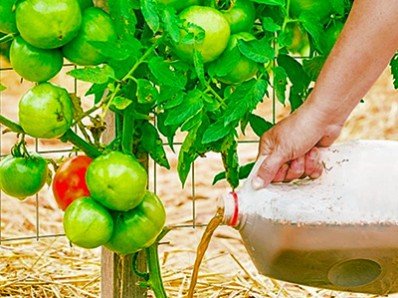Manure Tea to Nourish Your Plants
Author Ellen Vande Visse
If you are someone rich in a livestock manure source, you can make manure tea to fertilize your garden plants. By livestock, I mean 4-legged mammals and poultry. Note that this is not compost. It’s raw poop from cows, horses, pigs, rabbits, llamas, goats, and such. You’ll want to avoid cat and dog manure.
You’ve probably heard me harp about “Compost that manure before spreading!” But here is a different strategy: make a tea of that manure. You’ll save yourself the problems that come with applying manure directly on your soil, namely:
raw manure contains lots of weed seeds
raw manure robs soil of nitrogen while it decomposes
raw manure takes a few weeks to compost in a heap
raw manure can be so fresh that it burns plants if applied directly to soil
So try the tea of manure as a liquid fertilizer—no waiting for decomposition, no introducing weeds!
How?
Fill a mesh bag or old pillow case with manure. Place this gigantic tea bag in a bucket or barrel of water. No need to boil water for this tea; just use air-temperature water that’s de-chlorinated. Use about 2/3 water to 1/3 manure. Let this soak 1-3 days, stirring it occasionally if you have time. This steeping releases beneficial microbes and dissolves some mineral nutrients into the water. Since this tea is not actively aerated, this condition will favor anaerobic bacteria. Oh, oh…will it stink? Yep, somewhat. That smell indicates that helpful bacteria are at work. (Once applied to soil, the bacterial populations will change to aerobic.)
Next, pull out your tea bag. Dispose of the solid contents by mulching or side-dressing, or adding to your compost pile. Now dilute your home-made liquid fertilizer so that it is the color of a weak tea you’d drink. Apply this by watering it onto the base of your plants (drench application). Make batches every week to 10 days, and apply manure tea to your vegetables, flowers, shrubs, berry bushes, trees, and lawn. You’re gently feeding them minerals and microbes for free.
What is “fresh manure” vs. “aged manure”?
I refer to manure that is 1-5 days old as fresh. That’s when it is highest in nitrogen and has the strongest smell. Each day it is quickly losing nitrogen into the atmosphere in the form of ammonia (NH3). So you might apply fresh manure tea to your heavy feeders, like cole crops & lettuces, and less to root crops which do not require as much of this nutrient. See cautions below.
Medication Caution: It’s helpful to know if de-wormer and/or antibiotics have been administered to the livestock or horses recently. If they have, wait a few days (no one really knows how long) to collect manure for making effective tea. Why? When de-wormers are still present in the manure, they harm advantageous nematodes. When antibiotics are present, they suppress desirable bacteria populations. Nematodes and bacteria are essential and desirable members of the soil food web that feed your plants. Your job is to foster a healthy, diverse, and complex soil food web of bacteria, fungi, protozoans,nematodes, earthworms, etc. You don’t want to kill off portions of the microbe community. These vital microorganisms are underground chemists. They magically transform minerals to forms that plants can use. For example, if you kill the beneficial bacteria with antibiotics, and then these workers cannot do their jobs of supplying food and water to your vegetation. Thus, I recommend that you collect manure that was produced several days after the medicines were stopped.
Manure tea is free and easy to make. It takes a couple days to steep. It’s stinky, but it is effective as a fertilizer. So, apply as a drench for the root zone.
CAUTIONS:
It is easy to over-do applications. Dilute well! Then observe results.
Manure tea can burn leaves due to high nitrogen and other salt/mineral concentrations.
The manure can contain E. Coli, etc, so avoid applying onto edible plants.
Cow, pig, and poultry manure are very high in nitrogen, so dilute much more than with manures from horse, rabbit, and goat.
Steep, stir, dilute, apply
By comparison, actively aerated compost tea, when brewed properly, is ready in 24 hours and does not stink. In fact, it smells earthy and sweet. Compost tea has an exponentially larger and more diverse soil food web representation, and thus more benefit. The super-high fungal members present are especially effective in warding off most all plant diseases.

